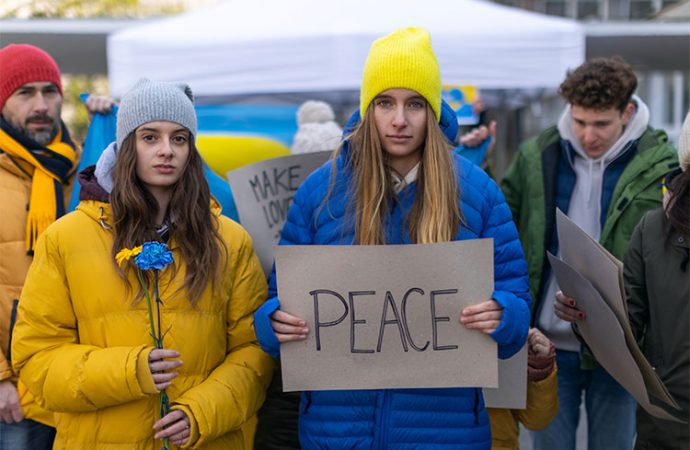Author Recent Posts Faiza Eiman Malik Latest posts by Faiza Eiman Malik (see all) Illegal Afghan Refugees and the Security Threat to Pakistan – September 19, 2025 Pakistan’s Disaster Preparedness and Deferred Resilience – September 10, 2025 Pakistan-US Oil Deal Redefines Diplomatic Relations – September 3, 2025
The Gaza humanitarian crisis shows that international law lacks enforcement mechanisms. A man-made famine is happening in Gaza with no aid allowed to reach there while people continue to burn and bombard. Gaza and its people are left to die while the rest of the world sleeps in peace. Despite the ICJ’s interim orders to stop genocidal acts and let the aid reach in Gaza, Israel has disregarded it continuously. On the other hand, ICJ’s final judgement mightn’t come until the end of 2027. Given the severity of Israel’s actions will Gaza and its people be even existing by that time. This leads us to think whether the ICJ’s intervention has any real status or is it just symbolic in front of political impunity?
ICJ’s intervention does carry legal weight, but it has brought little to no change in Gaza’s situation. Once that was a crisis is a catastrophe now. In early 2024, ICJ issued provisional measures restraining Israel to avoid genocidal acts. It has also ordered to allow humanitarian aid to Gaza. These provisional measures have been of no use to improve Gaza’s situation. Israel has constantly ignored ICJ and continued to violate humanitarian law and acts of injustice in Gaza. Humanitarian agencies are reporting that aid is being blocked. They even don’t have means to meet their daily life needs. It’s universally regarded fact that everyone should have access to food, water and shelter but they are being forcibly deprived of it. Experts have stated that the famine in Gaza which world is considering for future has already begun. The entire population in north of Gaza is starving to death.
Despite such serious violations, Israel continues to exist without any accountability. Israel has faced no real consequences of its actions so far. UN General Assembly has addressed broader issues to ICJ’s hearings, thereby questioning legality of Israel’s occupation and blockade. It has also pointed out Israel’s obligations under International Law. The hearings ended in May, two months have passed, but no advisory opinion is issued by the court. A separate case that was brought by South Africa against Israel is also pending. We may not receive any judgement till 2027, but we will probably lose all Gazan people by then for whom the case was initiated.
The ICJ’s legal role is grounded but it stays symbolic without any internal enforcement mechanism. Lack of this mechanism has made ICJ’s rulings heavily dependent on voluntary compliance and international political will of states. This creates a bigger issue where conflicts are asymmetric, one party possesses extreme military power while the other is underdeveloped. In such cases it’s not war that takes place it’s injustice, violation of rights and genocide, as in the case of Gaza Genocide by Israel. It becomes even more problematic when international actors start supplying weapons and begin trade deals with such state. The only consequence of it is severity of the crisis highlighting that international obligations are only optional. In this context, ICJ is no more than a court of conscience that failed to shield the innocent, starving and bombarded in real world.
We argue that ICJ’s rulings have legal as well as moral status but it lacks enforcement mechanisms. For now, ICJ’s rulings will be nothing but moral advice, without third state actions for example states can impose sanctions, travel ban, suspension of trade agreements etc, can be used to pressurize Israel. Some countries like South Africa, Bolivia etc. have taken measures but major powers like UK, US, Canada, Australia etc. have been reluctant towards it. UK has been supplying fighter Jets parts to Israel.Uk is not the only country who has defied the ICJ’s interim orders, US, Australia, Demark, Italy, Norway and Netherlands have also been part of this. This shows political dependency of ICJ. In the case if lack of enforcement continues ICJ will eventually become moral institute only diagnosing the atrocity and completely powerless to prevent it.
The clear gap between law and reality has emerged, which is devastating. Over, 60,000 people have been killed in Gaza, in which thousands are children. Israel has converted food and water as a weapon for war. Human rights organizations have recognized the Israel’s brutal acts as genocide. Even Israel’s own organizations like B’Tselem has stated that its apartheid and accuse its government of committing a genocide in Gaza strip but yet no legal forum including ICJ has been able to stop Israel. ICJ is limited by enforcement gaps and has been subject to global political paralysis.
In conclusion, ICJ is doing what it legally can to some extent, but it is clearly not enough. Interim orders should have been more focused on humanitarian security, for example access to humanitarian aid. Though advisory opinions are non-binding but with precise framing, states can be empowered to impose consequences not on the state violating international law but also the ones supporting such state on non-compliance. This will ensure that every such state is held accountable in any possible way. The severity of issue requires states to recognize ICJ’s orders not as suggestions but obligations. Only then it will be possible for ICJ to not only be symbolic but play a role of actor in real world.
- Illegal Afghan Refugees and the Security Threat to Pakistan - September 19, 2025
- Pakistan’s Disaster Preparedness and Deferred Resilience - September 10, 2025
- Pakistan-US Oil Deal Redefines Diplomatic Relations - September 3, 2025






















Leave a Comment
Your email address will not be published. Required fields are marked with *